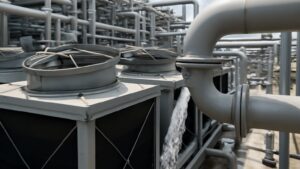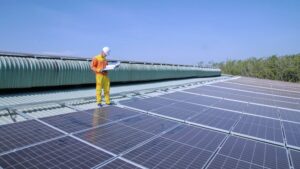As the world moves towards a more sustainable future, businesses are increasingly looking for ways to reduce their carbon footprint and operate in an environmentally responsible manner. Hydrogen fuel cells offer a promising solution to this challenge, potentially powering a range of industrial and commercial applications while reducing harmful emissions. This post will explore the key benefits of hydrogen fuel cells for businesses, including cost savings, operational efficiencies, and enhanced sustainability. We will also discuss real-world examples of companies that are already embracing this technology to create more sustainable infrastructure. So, whether you are a business owner, investor, or sustainability enthusiast, join us on this journey to discover the potential of these fuel cells for a more sustainable future.
Hydrogen fuel cells are gaining attention as a potential game-changer in the pursuit of sustainable infrastructure. These devices produce electricity by combining hydrogen and oxygen in a chemical reaction, producing water as the only byproduct. Here are some of the key benefits of hydrogen fuel cells and examples of how they are being used to create more sustainable infrastructure.
Cost Savings:
Hydrogen fuel cells can reduce operating costs and maintenance expenses. For example, Walmart has been using hydrogen fuel cells to power their material handling equipment in their distribution centers. This has led to significant cost savings as hydrogen fuel cells have a longer lifespan than traditional lead-acid batteries, which need to be replaced frequently. Additionally, the fast refueling times of hydrogen fuel cells mean that Walmart’s material handling equipment can operate continuously throughout the day, reducing downtime and increasing efficiency.
Operational Efficiencies:
Hydrogen fuel cells can improve the performance of various equipment and vehicles. For instance, the Tokyo Metropolitan Government has been using hydrogen fuel cell buses for public transportation. These buses are faster, quieter, and emit only water, providing a cleaner and more efficient alternative to traditional diesel buses. Buses also have a longer driving range, which is crucial for public transportation.
Enhanced Sustainability:
Hydrogen fuel cells can contribute to a cleaner and more sustainable future. For example, the Port of Los Angeles has been using hydrogen fuel cell vehicles for its cargo-handling operations. The use of these vehicles has reduced emissions and contributed to the port’s goal of becoming a zero-emissions facility. Additionally, hydrogen fuel cells can be used in stationary applications, such as backup power for data centers or as a source of heat and electricity for buildings, reducing the reliance on traditional fossil fuels.
Hydrogen: the future of sustainable power?
Overall, these fuel cells offer a promising solution to create more sustainable infrastructure. As more companies and organizations adopt this technology, we can expect to see significant improvements in cost savings, operational efficiencies, and enhanced sustainability. Whether it’s powering material handling equipment, public transportation, or cargo-handling operations, hydrogen fuel cells have the potential to revolutionize the way we power our infrastructure in a cleaner and more sustainable way. To that effect, companies should look into learning from peers and industry experts. The Global Summit on Scope 3 Emissions Reduction will bring together key industry experts to learn more about reporting strategies & carbon data management in a small-scale, industry-driven event, on 20-21st April 2023 in Amsterdam, the Netherlands. The two-day, hybrid event features in-depth case studies of supply chain transformation, carbon accounting, and networking breaks dedicated to exchanging insights and expertise on tackling Scope 3 emissions. Visit future-bridge.eu and netzero-events.com or follow us on our social media to track other energy use and decarbonization events.





